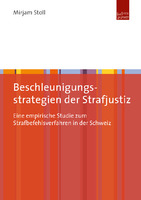Beschleunigungsstrategien der Strafjustiz
Eine empirische Studie zum Strafbefehlsverfahren in der Schweiz
| dc.contributor.author | Stoll, Mirjam | |
| dc.date.accessioned | 2019-03-22 03:00:41 | |
| dc.date.accessioned | 2020-04-01T10:46:29Z | |
| dc.date.available | 2020-04-01T10:46:29Z | |
| dc.date.issued | 2018 | |
| dc.identifier | 1004408 | |
| dc.identifier | OCN: 1100526430 | en_US |
| dc.identifier.uri | http://library.oapen.org/handle/20.500.12657/25683 | |
| dc.description.abstract | Accelerated forms of criminal proceedings have become enormously important in many jurisdictions. But how do authorities achieve this acceleration in practice? The author illustrates this using the example of the Swiss criminal order procedure. On the basis of a file analysis, the formal and informal strategies are identified with which the police and the public prosecutor's office are able to construct the trap characteristics that make a quick conviction by order of summary punishment admissible. | |
| dc.language | German | |
| dc.subject.classification | thema EDItEUR::J Society and Social Sciences::JH Sociology and anthropology::JHB Sociology | en_US |
| dc.subject.other | Criminal order proceedings | |
| dc.subject.other | criminal procedure | |
| dc.subject.other | procedural economy | |
| dc.subject.other | Strafbefehlsverfahren | |
| dc.subject.other | Strafprozess | |
| dc.subject.other | Verfahrensökonomie | |
| dc.title | Beschleunigungsstrategien der Strafjustiz | |
| dc.title.alternative | Eine empirische Studie zum Strafbefehlsverfahren in der Schweiz | |
| dc.type | book | |
| oapen.identifier.doi | 10.3224/86388749 | |
| oapen.relation.isPublishedBy | c71f4dcb-6466-4fde-8a25-0516cdd477b8 | |
| oapen.relation.isbn | 9783863887490 | |
| oapen.pages | 305 | |
| oapen.place.publication | Leverkusen-Opladen | |
| oapen.identifier.ocn | 1100526430 |

